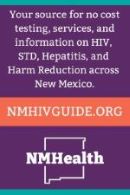Sexually Transmitted Diseases Program
The New Mexico Sexually Transmitted Diseases (STD) Prevention Program has as its primary goal the reduction and prevention of the incidence of sexually transmitted diseases including HIV infection.
The STD Program provides statewide consultation and technical assistance, partner services, screening, surveillance, health care provider education, case management, and partner notification for reportable STDs in the state.

Resource Guide
To find a STD testing or treatment program near you, visit our HIV/STD/Hepatitis Resource Guide.
This valuable community based website offering resources and information about services related to HIV, STDs, Viral Hepatitis, and Harm Reduction.
It features a searchable guide that will help you find the best and most appropriate services in your area.
Recent Activity
Health Data
Latest
- Sexually Transmitted Diseases Surveillance Report 2022 (Infectious Disease)
- Sexually Transmitted Diseases Surveillance Report 2021 (Infectious Disease)
- Sexually Transmitted Diseases Surveillance Report 2020 (Infectious Disease)
Publications
Featured
- Public Health Order - Congenital Syphilis 2023 (Rules & Regulations)
- STD Case Reporting Form (Form)
Latest
- Recommendation for Expanded Syphilis Screening to Reduce Rising Rates of Congenital Syphilis (General)
- Congenital Syphilis Algorithm (Guide)
- Clinical Interpretation of Syphilis Screening Algorithms (Guide)
Popular
- Syphilis – Evaluating Patients (Help)
- Public Health Order – Congenital Syphilis (Policies, Protocols & Procedures)
- NMDOH Guidelines for Expedited Partner Therapy (EPT) - 03/31/2023 (Help)
Resources
Latest
- STD Clinical Consultation Network
- CDC: STI Treatment Guidelines
- Congenital Syphilis - CDC Fact Sheet
Popular
Public Health Offices
You can also find a Public Health Office near you that provides services such as:
- Free exams and treatment for sexually transmitted diseases. (STD)
- Counseling and treatment for partners of people with STDs.
- Free HIV testing.
- Syringe exchange program for injection drug users.
- Birth control and emergency contraception. (Plan B)
- Minors do not need parental consent to receive services in the clinic
- All clinic services are confidential.
Expedited Partner Therapy
(Updated 4.3.23)
Expedited Partner Therapy has been legal in New Mexico under the Medical Practice Act since 2007. Health professionals can offer EPT to partners of patients with certain sexually transmitted diseases (STDs) under guidelines developed by the New Mexico Department of Health (NMDOH).
The current epidemiology of STDs in New Mexico calls for multiple strategies to reduce the incidence of sexually transmitted infections, including the use of EPT for partners who are unable or unlikely to seek timely treatment.
Providers
Notifiable Conditions
The following STDs are notifiable conditions:
- Chancroid
- Chlamydia
- Gonorrhea
- Syphilis
Who is Required to Report?

All STD cases diagnosed or treated in New Mexico are required by law to be reported to the STD Program in Santa Fe by using the STD Case Reporting Form.
Additionally, any medical laboratory anywhere in the United States performing testing for New Mexico must report positive results to the New Mexico STD Program in Santa Fe. This includes all clinicians seeing patients, laboratories doing testing, and administrators or Infection Control Staff at any medical facility. Medical facilities include all Private, Public, Tribal, Indian Health Service, Military, Veteran’s Affairs, Employee Health, Detention Centers, Jails, Prisons, and all other Medical Clinics, Hospitals, Emergency Wards or Urgent Care Centers.
Reports & Data
NMDOH follows procedures from the Centers for Disease Control and Prevention (CDC) in publishing data on reportable STDs. Final data is published here each April – 15 months after the close of the year (meaning that final 2021 data will appear in April 2023). Preliminary NM data – lacking some national rates and comparisons – is published each summer (meaning that preliminary 2022 data will appear in August 2023.)”
Sexually Transmitted Diseases
- Sexually Transmitted Diseases Surveillance Report 2022
- Sexually Transmitted Diseases Surveillance Report 2021
- Sexually Transmitted Diseases Surveillance Report 2020
- Sexually Transmitted Diseases Surveillance Report 2019
- Sexually Transmitted Diseases Surveillance Report 2018
- Sexually Transmitted Diseases Surveillance Report 2017
- Sexually Transmitted Diseases Surveillance Report 2016
- Sexually Transmitted Diseases Surveillance Report 2015
- Sexually Transmitted Diseases Surveillance Report 2014
- Sexually Transmitted Diseases Surveillance Report 2013
- Sexually Transmitted Diseases Surveillance Report 2012
- Sexually Transmitted Diseases Surveillance Report 2011
- Sexually Transmitted Diseases Surveillance Report 2010

